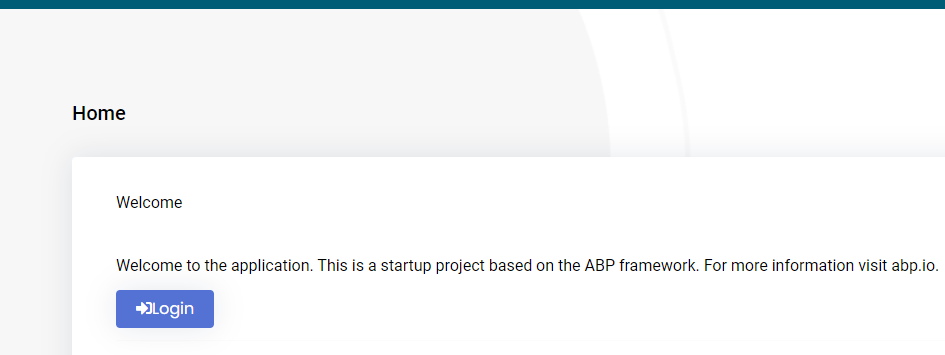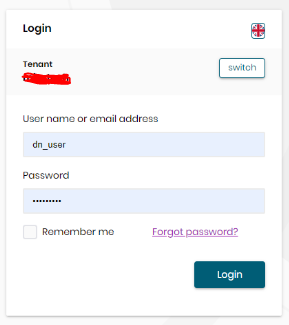I took a look at the static store implemenation and it looks like there's nothing I can do here:
public StaticPermissionDefinitionStore(
IServiceProvider serviceProvider,
IOptions<AbpPermissionOptions> options)
{
_serviceProvider = serviceProvider;
Options = options.Value;
_lazyPermissionDefinitions = new Lazy<Dictionary<string, PermissionDefinition>>(
CreatePermissionDefinitions,
isThreadSafe: true
);
_lazyPermissionGroupDefinitions = new Lazy<Dictionary<string, PermissionGroupDefinition>>(
CreatePermissionGroupDefinitions,
isThreadSafe: true
);
}
After the store is created, it uses CreatePermissionGroupDefinitions to generate the list of the available definition providers at the moment. This typically occurs when the host is started, before any authenticated app begins sending requests. Once this collection is established, it is not intended to be altered during runtime.
While it is possible to modify this behavior by overriding the class, doing so can introduce complexity and unpredictable consequences.
In the given situation I am ready to consider dynamic permissions usage. Could you please point me in right direction - how to use the CorePermissionDefinitionProvider(or its permissions) as dynamic permissions, not static ones? I've tried to find some info on ABP documentation site, but have not found anything relevant besides using boolean flag in the options indicating whether I want to use dynamic permissions.
Hi again. I've added the following middleware:
public class DynamicPermissionDefinitionMiddleware<T> where T : IPermissionDefinitionProvider
{
private readonly IOptions<AbpPermissionOptions> _permissionOptions;
private readonly RequestDelegate _next;
private bool _isAuthenticated;
public DynamicPermissionDefinitionMiddleware(RequestDelegate next, IOptions<AbpPermissionOptions> permissionOptions)
{
_next = next;
_permissionOptions = permissionOptions;
_isAuthenticated = false;
}
public async Task Invoke(HttpContext context)
{
if (context.User.Identity.IsAuthenticated && !_isAuthenticated)
{
_permissionOptions.Value.DefinitionProviders.Add(typeof(T)); //UPDATES DefinitionProviders as expected!
_isAuthenticated = true;
}
else if (!context.User.Identity.IsAuthenticated && _isAuthenticated)
{
_permissionOptions.Value.DefinitionProviders.Remove(typeof(T));
_isAuthenticated = false;
}
await _next(context);
}
}
into HttpApiHost project:
app.UseMiddleware<DynamicPermissionDefinitionMiddleware<CorePermissionDefinitionProvider>>();
Despite DefinitionProviders collection is filled as expected, the CorePermissionDefinitionProvider is not touched - even the constructor is not invoked (DisableConventionalRegistration is used to prevent trying ABP to add this provider automatically while the host is being loaded):
[DisableConventionalRegistration]
public class CorePermissionDefinitionProvider : PermissionDefinitionProvider
{
private readonly ICurrentUser _currentUser;
private readonly IServiceProvider _serviceProvider;
public CorePermissionDefinitionProvider
(
IServiceProvider serviceProvider,
ICurrentUser currentUser
)
{
_serviceProvider = serviceProvider; //NOT INVOKED!
_currentUser = currentUser;
}
...
}
What am I missing?
I know the basic principles of web app :) After all I see that there's no magic place to place this code. So I will need to use "if" guard condition inside a middleware checking if the request is authorized, so the permission definition provider can be added (once). I'm not closing the ticket yet: could be another questions coming along the way.
So the only place I can place the check is a middleware - meaning on each request "if [user is authenticated]"? I wanted to avoid this, but if there's no other place which is executed only once, I have no choice.
Sorry, it's not what I meant. I mean what is a suitable ABP code (handler, contributor, service method) which is executed once after the user has been successfully authenticated and which is not a part of Identity Server project?
Our solution is ALREADY a very customized (and we have not used dynamic permissions so far, I don't know what would turn out from this), so I am not afraid to experiment with static permissions. But anyway, I'd like to know the place where I can assign my per-tenant permissions. It needs to be a part of solution and invoked once after the user has been authorized. It must not happen in Identity Server project. As I see it, using a middleware is a bad choice, because the middleware Invoke method is get invoked on each request. Instead, I need to make it only once.
I have already overridden StaticPermissionDefinitionStore (for other task), so I can extend it with some new functionality.
But I need to understand how should I implement the task.
The aim is the following: there's configurable parameter in the database which can be different depending on the tenant and other things and in fact it determines the list of permissions.
So I need to read this parameter once the user is authenticated and his current tenant is known.
After this, I need to add just read permissions to the rest of permissions (and be able to assign them to roles as usual).
I know there are dynamic permissions in ABP, but I'd prefer not to make use of them.
What I have noticed:
then logging out from any page brings me to site Login dialog. Which looks like if the user IS logged out:

If I click "Login" - I am brought to Identity Server Login page (note: I am not automatically logged in!)

However, using AuthGuard for a default route ('') causes this behavior I've described in the very beginning. Though, I don't want to go to the first login form, so this "workaround" does not suit me.
I also took a look at Identity Server log (this is the fragment of what is happening after pressing "Logout") and the following looks weird to me: why the authorize request is sent straight after successful token revocation? The configuration of Identity Server looks usual to me, we have not changed it, but probably some configuration aspects are missing?
2023-09-18 01:10:05.334 -05:00 [DBG] Refresh token revoked 2023-09-18 01:10:06.116 -05:00 [INF] Token revocation complete 2023-09-18 01:10:06.116 -05:00 [INF] {"ClientId":"XXX","ClientName":"XXX","TokenType":"refresh_token","Token":"****6492","Category":"Token","Name":"Token Revoked Success","EventType":"Success","Id":2010,"Message":null,"ActivityId":"800001b8-0004-f900-b63f-84710c7967bb","TimeStamp":"2023-09-18T06:10:06.0000000Z","ProcessId":24860,"LocalIpAddress":"::1:44357","RemoteIpAddress":"::1","$type":"TokenRevokedSuccessEvent"} 2023-09-18 01:10:06.707 -05:00 [INF] Request finished HTTP/1.1 POST https://localhost:44357/connect/revocation application/x-www-form-urlencoded 149 - 200 - - 5005.9323ms 2023-09-18 01:10:06.808 -05:00 [INF] Request starting HTTP/1.1 GET https://localhost:44357/connect/authorize?response_type=code&client_id=XXX&state=YYY&redirect_uri=https%3A%2F%2Flocalhost%3A4200&scope=ZZZ&code_challenge=MMM&code_challenge_method=S256&nonce=NNN&culture=en&ui-culture=en - - 2023-09-18 01:10:06.840 -05:00 [DBG] Request path /connect/authorize matched to endpoint type Authorize 2023-09-18 01:10:06.859 -05:00 [DBG] Endpoint enabled: Authorize, successfully created handler: IdentityServer4.Endpoints.AuthorizeEndpoint 2023-09-18 01:10:06.859 -05:00 [INF] Invoking IdentityServer endpoint: IdentityServer4.Endpoints.AuthorizeEndpoint for /connect/authorize 2023-09-18 01:10:06.862 -05:00 [DBG] Start authorize request
There is a lot of information here - cut - but finally there is also the error (which does not prevent user logging in):
2023-09-18 01:10:06.926 -05:00 [DBG] client configuration validation for client XXX succeeded. 2023-09-18 01:10:06.926 -05:00 [DBG] Checking for PKCE parameters 2023-09-18 01:10:07.021 -05:00 [INF] {"Details":"System.Threading.Tasks.TaskCanceledException: A task was canceled.\r\n at Microsoft.EntityFrameworkCore.Storage.RelationalConnection.OpenInternalAsync(Boolean errorsExpected, CancellationToken cancellationToken)\r\n at Microsoft.EntityFrameworkCore.Storage.RelationalConnection.OpenInternalAsync(Boolean errorsExpected, CancellationToken cancellationToken)\r\n at Microsoft.EntityFrameworkCore.Storage.RelationalConnection.OpenAsync(CancellationToken cancellationToken, Boolean errorsExpected)\r\n at Oracle.EntityFrameworkCore.Storage.Internal.OracleRelationalCommandBuilderFactory.OracleRelationalCommandBuilder.OracleRelationalCommand.ExecuteReaderAsync(RelationalCommandParameterObject parameterObject, CancellationToken cancellationToken)\r\n at Microsoft.EntityFrameworkCore.Query.Internal.SplitQueryingEnumerable
1.AsyncEnumerator.InitializeReaderAsync(AsyncEnumerator enumerator, CancellationToken cancellationToken)\r\n at Oracle.EntityFrameworkCore.Storage.Internal.OracleExecutionStrategy.ExecuteAsync[TState,TResult](TState state, Func4 operation, Func4 verifySucceeded, CancellationToken cancellationToken)\r\n at Microsoft.EntityFrameworkCore.Query.Internal.SplitQueryingEnumerable1.AsyncEnumerator.MoveNextAsync()\r\n at Microsoft.EntityFrameworkCore.EntityFrameworkQueryableExtensions.ToListAsync[TSource](IQueryable1 source, CancellationToken cancellationToken)\r\n at Microsoft.EntityFrameworkCore.EntityFrameworkQueryableExtensions.ToListAsync[TSource](IQueryable1 source, CancellationToken cancellationToken)\r\n at Volo.Abp.IdentityServer.IdentityResources.IdentityResourceRepository.GetListByScopeNameAsync(String[] scopeNames, Boolean includeDetails, CancellationToken cancellationToken)\r\n at Castle.DynamicProxy.AsyncInterceptorBase.ProceedAsynchronous[TResult](IInvocation invocation, IInvocationProceedInfo proceedInfo)\r\n at Volo.Abp.Castle.DynamicProxy.CastleAbpMethodInvocationAdapterWithReturnValue1.ProceedAsync()\r\n at Volo.Abp.Uow.UnitOfWorkInterceptor.InterceptAsync(IAbpMethodInvocation invocation)\r\n at Volo.Abp.Castle.DynamicProxy.CastleAsyncAbpInterceptorAdapter1.InterceptAsync[TResult](IInvocation invocation, IInvocationProceedInfo proceedInfo, Func3 proceed)\r\n at Volo.Abp.IdentityServer.ResourceStore.<FindIdentityResourcesByScopeNameAsync>b__34_0(String[] keys)\r\n at Volo.Abp.IdentityServer.ResourceStore.GetCacheItemsAsync[TEntity,TModel](IDistributedCache1 cache, IEnumerable1 keys, Func2 entityFactory, Func3 cacheItemsFactory, String cacheKeyPrefix)\r\n at Volo.Abp.IdentityServer.ResourceStore.FindIdentityResourcesByScopeNameAsync(IEnumerable1 scopeNames)\r\n at IdentityServer4.Stores.IResourceStoreExtensions.FindResourcesByScopeAsync(IResourceStore store, IEnumerable1 scopeNames)\r\n at IdentityServer4.Stores.IResourceStoreExtensions.FindEnabledResourcesByScopeAsync(IResourceStore store, IEnumerable1 scopeNames)\r\n at IdentityServer4.Validation.DefaultResourceValidator.ValidateRequestedResourcesAsync(ResourceValidationRequest request)\r\n at IdentityServer4.Validation.AuthorizeRequestValidator.ValidateScopeAsync(ValidatedAuthorizeRequest request)\r\n at IdentityServer4.Validation.AuthorizeRequestValidator.ValidateAsync(NameValueCollection parameters, ClaimsPrincipal subject)\r\n at IdentityServer4.Endpoints.AuthorizeEndpointBase.ProcessAuthorizeRequestAsync(NameValueCollection parameters, ClaimsPrincipal user, ConsentResponse consent)\r\n at IdentityServer4.Endpoints.AuthorizeEndpoint.ProcessAsync(HttpContext context)\r\n at IdentityServer4.Hosting.IdentityServerMiddleware.Invoke(HttpContext context, IEndpointRouter router, IUserSession session, IEventService events, IBackChannelLogoutService backChannelLogoutService)","Category":"Error","Name":"Unhandled Exception","EventType":"Error","Id":3000,"Message":"A task was canceled.","ActivityId":"800000d9-0007-ff00-b63f-84710c7967bb","TimeStamp":"2023-09-18T06:10:07.0000000Z","ProcessId":24860,"LocalIpAddress":"::1:44357","RemoteIpAddress":"::1","$type":"UnhandledExceptionEvent"} 2023-09-18 01:10:07.021 -05:00 [INF] {"Details":"System.Threading.Tasks.TaskCanceledException: A task was canceled.\r\n at Microsoft.EntityFrameworkCore.Storage.RelationalConnection.OpenInternalAsync(Boolean errorsExpected, CancellationToken cancellationToken)\r\n at Microsoft.EntityFrameworkCore.Storage.RelationalConnection.OpenInternalAsync(Boolean errorsExpected, CancellationToken cancellationToken)\r\n at Microsoft.EntityFrameworkCore.Storage.RelationalConnection.OpenAsync(CancellationToken cancellationToken, Boolean errorsExpected)\r\n at Oracle.EntityFrameworkCore.Storage.Internal.OracleRelationalCommandBuilderFactory.OracleRelationalCommandBuilder.OracleRelationalCommand.ExecuteReaderAsync(RelationalCommandParameterObject parameterObject, CancellationToken cancellationToken)\r\n at Microsoft.EntityFrameworkCore.Query.Internal.SplitQueryingEnumerable1.AsyncEnumerator.InitializeReaderAsync(AsyncEnumerator enumerator, CancellationToken cancellationToken)\r\n at Oracle.EntityFrameworkCore.Storage.Internal.OracleExecutionStrategy.ExecuteAsync[TState,TResult](TState state, Func4 operation, Func4 verifySucceeded, CancellationToken cancellationToken)\r\n at Microsoft.EntityFrameworkCore.Query.Internal.SplitQueryingEnumerable1.AsyncEnumerator.MoveNextAsync()\r\n at Microsoft.EntityFrameworkCore.EntityFrameworkQueryableExtensions.ToListAsync[TSource](IQueryable1 source, CancellationToken cancellationToken)\r\n at Microsoft.EntityFrameworkCore.EntityFrameworkQueryableExtensions.ToListAsync[TSource](IQueryable1 source, CancellationToken cancellationToken)\r\n at Volo.Abp.IdentityServer.IdentityResources.IdentityResourceRepository.GetListByScopeNameAsync(String[] scopeNames, Boolean includeDetails, CancellationToken cancellationToken)\r\n at Castle.DynamicProxy.AsyncInterceptorBase.ProceedAsynchronous[TResult](IInvocation invocation, IInvocationProceedInfo proceedInfo)\r\n at Volo.Abp.Castle.DynamicProxy.CastleAbpMethodInvocationAdapterWithReturnValue1.ProceedAsync()\r\n at Volo.Abp.Uow.UnitOfWorkInterceptor.InterceptAsync(IAbpMethodInvocation invocation)\r\n at Volo.Abp.Castle.DynamicProxy.CastleAsyncAbpInterceptorAdapter1.InterceptAsync[TResult](IInvocation invocation, IInvocationProceedInfo proceedInfo, Func3 proceed)\r\n at Volo.Abp.IdentityServer.ResourceStore.<FindIdentityResourcesByScopeNameAsync>b__34_0(String[] keys)\r\n at Volo.Abp.IdentityServer.ResourceStore.GetCacheItemsAsync[TEntity,TModel](IDistributedCache1 cache, IEnumerable1 keys, Func2 entityFactory, Func3 cacheItemsFactory, String cacheKeyPrefix)\r\n at Volo.Abp.IdentityServer.ResourceStore.FindIdentityResourcesByScopeNameAsync(IEnumerable1 scopeNames)\r\n at IdentityServer4.Stores.IResourceStoreExtensions.FindResourcesByScopeAsync(IResourceStore store, IEnumerable1 scopeNames)\r\n at IdentityServer4.Stores.IResourceStoreExtensions.FindEnabledResourcesByScopeAsync(IResourceStore store, IEnumerable1 scopeNames)\r\n at IdentityServer4.Validation.DefaultResourceValidator.ValidateRequestedResourcesAsync(ResourceValidationRequest request)\r\n at IdentityServer4.Validation.AuthorizeRequestValidator.ValidateScopeAsync(ValidatedAuthorizeRequest request)\r\n at IdentityServer4.Validation.AuthorizeRequestValidator.ValidateAsync(NameValueCollection parameters, ClaimsPrincipal subject)\r\n at IdentityServer4.Endpoints.AuthorizeEndpointBase.ProcessAuthorizeRequestAsync(NameValueCollection parameters, ClaimsPrincipal user, ConsentResponse consent)\r\n at IdentityServer4.Endpoints.AuthorizeEndpoint.ProcessAsync(HttpContext context)\r\n at IdentityServer4.Hosting.IdentityServerMiddleware.Invoke(HttpContext context, IEndpointRouter router, IUserSession session, IEventService events, IBackChannelLogoutService backChannelLogoutService)","Category":"Error","Name":"Unhandled Exception","EventType":"Error","Id":3000,"Message":"A task was canceled.","ActivityId":"800001e1-0004-f500-b63f-84710c7967bb","TimeStamp":"2023-09-18T06:10:07.0000000Z","ProcessId":24860,"LocalIpAddress":"::1:44357","RemoteIpAddress":"::1","$type":"UnhandledExceptionEvent"} 2023-09-18 01:10:07.021 -05:00 [FTL] Unhandled exception: A task was canceled.
I have custom Permission Definition Provider:
using AbxEps.CT.Core.Extensions;
using AbxEps.CT.Core.Localization;
using AbxEps.CT.Core.PortalMenu;
using Microsoft.Extensions.DependencyInjection;
using System;
using System.Threading.Tasks;
using Volo.Abp.Authorization.Permissions;
using Volo.Abp.Localization;
using Volo.Abp.Threading;
using Volo.Abp.Users;
namespace AbxEps.CT.Core.Permissions
{
public class CorePermissionDefinitionProvider : PermissionDefinitionProvider
{
private readonly ICurrentUser _currentUser;
private readonly IAbxPortalsMenuAppService _abxPortalsMenuAppService;
public CorePermissionDefinitionProvider
(
IAbxPortalsMenuAppService abxPortalsMenuAppService,
ICurrentUser currentUser
)
{
_abxPortalsMenuAppService = abxPortalsMenuAppService;
_currentUser = currentUser;
}
public override void Define(IPermissionDefinitionContext context)
{
var coreCtGroup = context.AddGroup(CorePermissions.GroupName, L("Permission:Core"));
var fileMngPermission = coreCtGroup.AddPermission(CorePermissions.FileManager.Read, L("Permission:FileManager:Read"));
fileMngPermission.AddChild(CorePermissions.FileManager.Modify, L("Permission:FileManager:Modify"));
if (_currentUser.IsAuthenticated)
{
AsyncHelper.RunSync(() => InitPortalAccessPermissionsAsync(context)); // Not called, because when the host is started the user is still not authenticated - so "if" condition is not invoked
}
}
private async Task InitPortalAccessPermissionsAsync(IPermissionDefinitionContext context)
{
...
}
}
}
Whereas the permissions which are supposed to be added unconditionally (fileMngPermissions) are added successfully when host is running, the permissions which need to be added only after the user is authenticated (portalAccessPermissions) are obviously not added and not visible via IPermissionAppService:
var allPermissionsForRole = await _permissionAppService.GetAsync("R", "Role 1");
How to add a whole CorePermissionDefinitionProvider or the part of its relevant permissions (portalAccessPermissions) conditionally - once the user got authenticated?
P.S. I'd prefer not to use Middleware, because its Invoke method is invoked on each request. Instead, I need to add my CorePermissionDefinitionProvider or its authentication-related permissions once after the user authentication was successful. I use external authentication via Identity Server. So this functionality needs to reside inside the application project, not Identity Server project.
Making PermissionDefinitionManager a ITransientDependency (or probably I can make CorePermissionDefinitionProvider transient too) does not sound good either: I dot not want to trigger the check each time. I just need to trigger it ONCE, but after the user has been authenticated.
I do not have ngOnInit override from component's base class. So I put the breakpoint in the base class ngOnInit method. And this method is only invoked when the user is authenticated.

